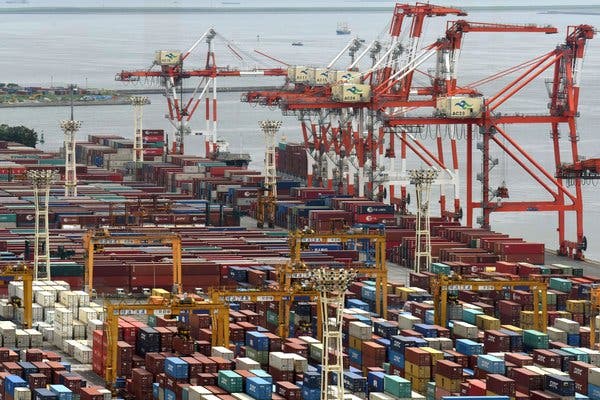Impact Of Potential Tariffs On Japan's Shrinking Economy (Q1)

Table of Contents
Current State of the Japanese Economy
Japan's economy is characterized by a complex interplay of long-term structural issues and cyclical challenges. The country faces a significant demographic headwind, with a declining birthrate and rapidly aging population leading to a shrinking workforce. This demographic shift reduces the potential for economic growth and places a strain on social security systems. Recent economic growth figures have been consistently underwhelming, often hovering near stagnation or experiencing periods of contraction. Underlying weaknesses include stagnant wages, weak consumer spending, and a high level of national debt. Furthermore, Japan's economy is heavily reliant on exports, making it acutely vulnerable to global trade disruptions and the imposition of tariffs. Key export markets like the US and China are vital for maintaining the country's economic stability.
- Low birth rate and aging population impacting workforce productivity and future growth.
- Stagnant wages and weak consumer spending hinder domestic demand.
- High national debt limits the government's fiscal flexibility to respond to economic shocks.
- Dependence on exports, particularly to the US and China, creates vulnerability to trade wars and protectionist measures.
Potential Tariff Impacts on Key Japanese Industries
The imposition of tariffs, either on Japanese exports or imports, would have significant repercussions across various sectors of the Japanese economy.
Automotive Industry
Japan's automotive industry, a global leader, would be severely impacted by tariffs. Increased tariffs on Japanese car exports to major markets, particularly the US, would increase production costs, making Japanese vehicles less competitive internationally. This could lead to reduced export volumes, factory closures, and substantial job losses throughout the automotive sector and related supply chains.
- Increased production costs due to tariffs would reduce profit margins.
- Reduced competitiveness in global markets could lead to market share loss.
- Potential job losses in the automotive sector and related industries like parts manufacturing and logistics.
Electronics Industry
Similar challenges would face Japan's electronics industry. Tariffs could lead to price increases for Japanese electronics in export markets, impacting consumer demand. This would reduce export volumes and increase competition from other countries. The semiconductor industry, a crucial component of the electronics sector, would also be significantly affected, potentially impacting technological innovation and global competitiveness.
- Price increases for consumers would likely reduce demand.
- Reduced export volumes due to lower competitiveness.
- Increased competition from countries with lower production costs or fewer tariff burdens.
Agriculture and Food Industry
Tariffs on agricultural imports and exports would impact Japanese consumers and producers. Increased tariffs on imported food products could lead to significantly higher prices for Japanese consumers, affecting their purchasing power and potentially impacting food security. Conversely, tariffs on Japanese agricultural exports would reduce their competitiveness in international markets.
- Increased food prices for consumers, potentially impacting household budgets.
- Reduced competitiveness of Japanese agricultural products in global markets.
- Potential negative impact on Japan's food security due to reliance on imports.
The Impact on the Japanese Yen
The imposition of tariffs could significantly affect the value of the Japanese Yen. Depending on market sentiment and the magnitude of the tariffs, the Yen could either appreciate or depreciate. A depreciation could make Japanese exports cheaper, potentially offsetting some of the tariff impact. However, it would also increase the cost of imports, potentially fueling inflation. Conversely, an appreciation could harm export competitiveness while lowering import costs. The uncertainty surrounding currency fluctuations could lead to capital flight, further destabilizing the economy.
- Yen depreciation or appreciation would depend on market reactions and the scale of tariff implementation.
- Impact on import and export costs would affect businesses and consumers differently.
- Effect on foreign investment in Japan could impact long-term economic growth.
Government Response and Mitigation Strategies
The Japanese government would likely implement various mitigation strategies to offset the negative impacts of potential tariffs. These could include fiscal stimulus packages to boost domestic demand, monetary policy adjustments to manage inflation and currency fluctuations, and intensified trade negotiations to secure favorable trade agreements with other countries. Diversifying export markets away from those imposing tariffs would also be crucial. However, the effectiveness of these strategies would depend on their scale and the severity of the tariff impacts.
- Fiscal stimulus packages to boost domestic demand and support affected industries.
- Monetary policy adjustments to manage inflation and stabilize the Yen.
- Trade negotiations and diversification of export markets to reduce reliance on specific trading partners.
Conclusion
The potential imposition of tariffs poses a significant threat to Japan's already shrinking economy. The vulnerability of key industries like automotive, electronics, and agriculture, combined with the potential for currency fluctuations and reduced consumer spending, highlights the gravity of the situation. Understanding the impact of tariffs on Japan's economy requires careful monitoring and analysis. Mitigating the effects of potential tariffs demands proactive policy responses, including strategic diversification of export markets, bolstering domestic demand, and fostering economic resilience. Staying informed about developments in trade policy and their potential impact on Japan is crucial for both businesses and policymakers. Ignoring the potential economic crisis stemming from tariffs on Japan's economy could have far-reaching and long-lasting consequences.

Featured Posts
-
 Tam Krwz Ke Jwte Pr Mdah Ka Hmlh Swshl Mydya Pr Bhth
May 17, 2025
Tam Krwz Ke Jwte Pr Mdah Ka Hmlh Swshl Mydya Pr Bhth
May 17, 2025 -
 Mdah Ne Tam Krwz Ke Jwte Pr Pawn Rkha Kya Hwa
May 17, 2025
Mdah Ne Tam Krwz Ke Jwte Pr Pawn Rkha Kya Hwa
May 17, 2025 -
 Updated Injury Report Giants And Mariners April 4 6
May 17, 2025
Updated Injury Report Giants And Mariners April 4 6
May 17, 2025 -
 New York Knicks And St John S Thibodeaus Positive Remarks On Recent Success
May 17, 2025
New York Knicks And St John S Thibodeaus Positive Remarks On Recent Success
May 17, 2025 -
 Suri Cruise Tom Cruises Uncommon Post Natal Gesture
May 17, 2025
Suri Cruise Tom Cruises Uncommon Post Natal Gesture
May 17, 2025
Latest Posts
-
 Nba Game 4 Pistons Frustration Over Questionable Foul Call
May 17, 2025
Nba Game 4 Pistons Frustration Over Questionable Foul Call
May 17, 2025 -
 Delinquent Student Loans The Governments Aggressive Pursuit And Your Rights
May 17, 2025
Delinquent Student Loans The Governments Aggressive Pursuit And Your Rights
May 17, 2025 -
 Grocery Prices And Wages Rep Crockett Sounds The Alarm On Trumps Policies
May 17, 2025
Grocery Prices And Wages Rep Crockett Sounds The Alarm On Trumps Policies
May 17, 2025 -
 Preocupacion Entre Deudores El Impacto De Un Segundo Mandato De Trump En Los Prestamos Estudiantiles
May 17, 2025
Preocupacion Entre Deudores El Impacto De Un Segundo Mandato De Trump En Los Prestamos Estudiantiles
May 17, 2025 -
 Post Game 4 Outrage Pistons Slam Referees Over Foul Call
May 17, 2025
Post Game 4 Outrage Pistons Slam Referees Over Foul Call
May 17, 2025
